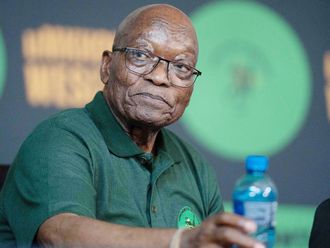Freetown: UN chief Ban Ki-moon on Friday pledged support for Ebola-ravaged countries seeking to end the world’s worst outbreak of the virus and rebuild their health systems as he began a tour of the three hardest-hit nations.
With the UN having faced criticism for an allegedly slow response to the virus, Ban started the tour in Liberia, the worst-hit country, after flying in from Ghana, where the UN Ebola mission is headquartered.
He later travelled to Sierra Leone and was due to fly to Guinea, the other two worst affected countries, as well as Mali. Mali has not seen a new case for three weeks, completing one of the two incubation periods the country needs to be declared free of the virus.
“Today we have reason to be cautiously optimistic that this terrible outbreak can be defeated,” Ban said at a joint press conference with Liberian President Ellen Johnson Sirleaf.
“The spread of the virus is slowing down in Liberia. Our response strategy is working.”
He highlighted the international response and thanked health workers and military members who have travelled to the region to assist.
“We are committed to stand with you now as you face this merciless threat,” Ban said.
“We will be with you until the outbreak is under control and the country has recovered.
Arriving later in Sierra Leone, Ban said efforts must be made to “get kids back in school, fields planted, and markets up and running again.
“And beyond halting Ebola, we need to build up health systems and other infrastructure that will forestall something similar occurring in the future.”
Ban’s visit comes a year after the outbreak began in Guinea and follows sharp criticism from non-governmental organisations that UN agencies like the World Health Organization have been too slow to respond.
He was accompanied by Margaret Chan, head of the World Health Organization, David Nabarro, the UN coordinator for the fight against Ebola, and Anthony Banbury, the head of the UN Mission for Ebola Emergency Response or UNMEER.
It marked the highest-level such tour since the epidemic began. French President Francois Hollande had been the only non-African head of state to visit one of the worst-hit countries with is trip to Guinea on November 29.
Fire burns supplies
Last month, Ban had said that, with increased international mobilisation, the outbreak could be brought under control in 2015
Ebola has killed more than 6,900 people, almost all of them in west Africa.
Liberia tops the number of fatalities at 3,290 deaths but Sierra Leone earlier this month overtook it as the country with the most infections.
Ban is due in the Guinea capital Conakry on Saturday. In a setback on Thursday, a fire at a warehouse at the Conakry airport destroyed materials due to be used in the fight against Ebola.
It was unclear what started the fire, which occurred at a warehouse containing drugs and lab equipment. UNMEER called the incident a regrettable loss of supplies.
In Sierra Leone, efforts have begun to identify suspected cases through door-to-door operations.
Around 60 ill people were identified and taken to centres to be tested for Ebola during such searches in the country’s hard-hit west, said the head of the National Ebola Resource Centre Palo Conteh.
Local Government Minister Diana Konomani-Kabba has also suspended 60 village heads in the Waterloo area in the east of the capital Freetown for three months for “failing to attend a vital information meeting on Ebola.”












